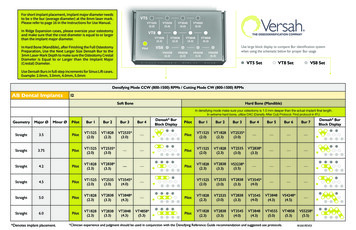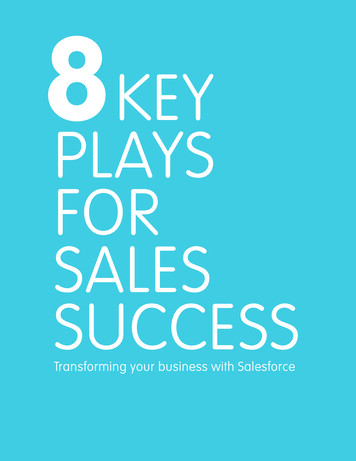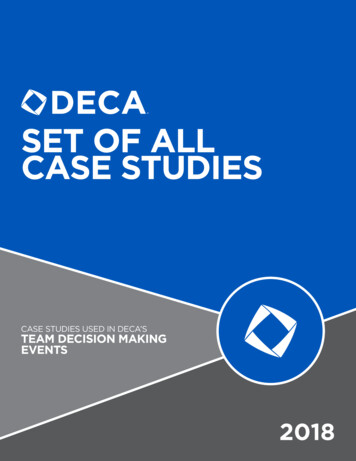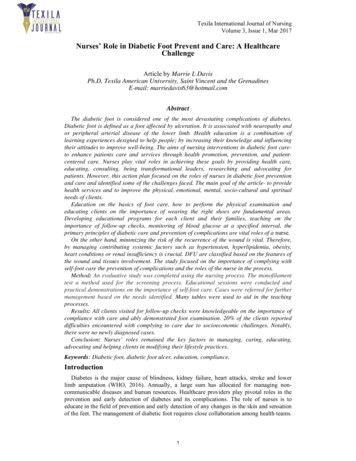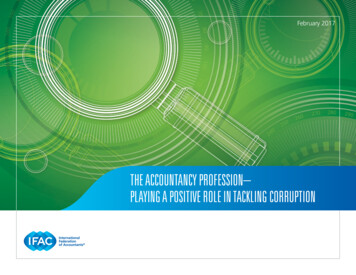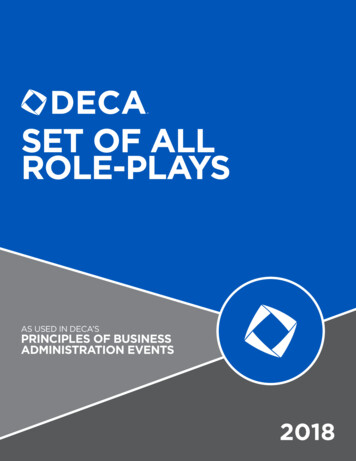
Transcription
SET OF ALLROLE-PLAYSAS USED IN DECA’SPRINCIPLES OF BUSINESSADMINISTRATION EVENTS2018
PRINCIPLESOF BUSINESSMANAGEMENT ANDADMINISTRATIONAS USED IN DECA’SPRINCIPLES OF BUSINESSADMINISTRATION EVENTS2018
PRINCIPLESOF BUSINESSMANAGEMENT ADMINISTRATION2018 ROLE-PLAYSINCLUDES:INTEGRATE DECA’S ROLE-PLAYS AND CASE STUDIES INTO YOUR CLASSROOMROLE-PLAY 1: CUSTOMER RELATIONSROLE-PLAY 2: OPERATIONSROLE-PLAY 3: EMOTIONAL INTELLIGENCEPublished by Shop DECA. Copyright 2018 by DECA Inc., 1908 Association Drive, Reston, VA 20191.No part of this publication may be reproduced for resale without written permision from the publisher. Printed in the United States.
INTEGRATE DECA’S ROLE-PLAYS AND CASE STUDIESINTO YOUR CLASSROOMWith its connection to National Curriculum Standards, DECA’s Competitive Events Program is designed to be integrated intoclassroom instruction to help members apply learning and connect to business. As teaching tools, DECA’s role-plays and casestudies provide relevant, meaningful problems for students to solve, provide a standards-based evaluation, increase rigor of theinstruction, result in evidence of student learning and expose students to DECA – all as part of classroom instruction.STEP 1: FAMILIARIZE YOURSELF WITH EVENT GUIDELINES AND PERFORMANCE INDICATORS.Use the DECA Guide to familiarize yourself with event guidelines that explain how each competitive event will operate – timelimits, exam specifications, interactions with a judge, etc.Role-plays and case studies are developed using performance indicators – key concepts from national curriculum standardsthat students should learn during the school year. DECA uses five lists of performance indicators which are organized by careercluster – business administration core, business management and administration, finance, hospitality and tourism, and marketing,as well as personal financial literacy.Each performance indicator list is arranged by instructional areas to assist advisors with planning units of instruction. Advisorsteaching accounting courses, for example, can use the Finance Career Cluster performance indicator list to plan their curriculumwhile advisors teaching marketing courses can use the Marketing Career Cluster performance indicator list.STEP 2: UNDERSTAND HOW ROLE-PLAYS AND CASE STUDIES ARE DESIGNED.The career cluster and primary instructional area for role-plays and case studies are identified at the top of the first page of theevent.Role-plays used for DECA’s Principles of Business Administration Events measure four performance indicators from the businessadministration core.Case studies used for DECA’s Team Decision Making Events measure seven performance indicators. Usually, at least four of theseven performance indicators have been selected from the case study’s instructional area. Therefore, if the event situation isasking the participant to develop a promotion plan, most of the performance indicators will be from the promotion instructionalarea.Role-plays used for DECA’s Individual Series Events measure five performance indicators. Usually, at least three of the fiveperformance indicators have been selected from the event situation’s instructional area. The career pathway is also identified onthe role-play, which may include performance indicators from that specific pathway as well.Role-plays used for DECA’s Personal Financial Literacy event measure three performance indicators from the National Standardsin K–12 Personal Finance Education, created and maintained by the Jump tart Coalition for Personal Financial Literacy.STEP 3: START ORGANIZING SAMPLE EVENTS.Each year, DECA posts sample role-plays and case studies on deca.org. Shop DECA also sells previously used events each year.Gather these samples and begin to categorize them by instructional area.STEP 4: USE SAMPLE EVENTS AS A CLASSROOM ACTIVITY.As you teach different instructional areas during the year, use corresponding role-plays and case studies as learning tools. Whilethe traditional competitive event setting requires interaction with judges, many advisors have used role-plays and case studies as: warm-up activities at the beginning of classes. writing exercises that require students to write their ideas for solving the problem presented in the role-play or case study. public speaking exercises that require students to deliver an oral report or recorded video that presents their ideas forsolving the problem presented in the role-play or case study. assessment tools in lieu of a multiple-choice quiz/test.Since the evaluation form for each role-play and case study assesses the performance indicators, you are assessing students’performance according to national curriculum standards which are industry validated and aligned to career clusters.ADDITIONAL RESOURCESEvent guidelines, performance indicator lists, sample events and sample exam questions are available at www.deca.org/competitiveevents. Sample role-play presentations can be viewed at www.deca.org. Advisors may wish to show the videosand ask students to evaluate the presentations using the evaluation forms. Shop DECA sells many items to assist advisors withintegrating DECA into curriculum at shopdeca.org.
CAREER CLUSTERBusiness Management and AdministrationINSTRUCTIONAL AREACustomer RelationsPRINCIPLES OF BUSINESS MANAGEMENT AND ADMINISTRATIONEVENTPARTICIPANT INSTRUCTIONS The event will be presented to you through your reading of the 21st Century Skills, PerformanceIndicators and Event Situation. You will have up to 10 minutes to review this information andprepare your presentation. You may make notes to use during your presentation. You will have up to 10 minutes to make your presentation to the judge (you may have morethan one judge). You will be evaluated on how well you meet the performance indicators of this event. Turn in all of your notes and event materials when you have completed the event.21st CENTURY SKILLS Critical Thinking – Reason effectively and use systems thinking. Communication – Communicate clearly. Creativity and Innovation – Show evidence of creativity.PERFORMANCE INDICATORS1. Handle customer/client complaints.2. Reinforce service orientation through communication.3. Identify a company’s brand promise.4. Build and maintain relationships with customers.Published 2018 by DECA Inc. Copyright 2018 by DECA Inc. No part of this publication may be reproduced forresale or posted online without written permission from the publisher. Printed in the United States of America.
EVENT SITUATIONYou are to assume the role of customer service specialist at MAIN STREET HEATING & COOLING, alocal company that provides the community with heating and cooling units, servicing andemergency calls. A customer (judge) has come to your office to complain and you must remedythe situation.MAIN STREET HEATING & COOLING is located in a city of 50,000 people and has been providingthe small community with heating and cooling units and service for over 35 years. While there areother heating and cooling companies in the area, most are chains or affiliated with companies froma much larger city 50 miles away. MAIN STREET HEATING & COOLING is proud to be the hometownchoice for all heating and cooling needs.Due to an unusual cold snap in the weather, many customers have called MAIN STREET HEATING& COOLING for repairs and/or upkeep of their heating and cooling units. When a customer calls tomake an appointment for service, a half-day time frame is given for the customer to expect a MAINSTREET representative to arrive. The time frame is either 8:00 AM – Noon or 1:00 PM – 5:00 PM.The MAIN STREET representative calls the customer the day of the appointment to give a moreprecise time when he or she is on their way.A customer (judge) has come to your office to complain that the MAIN STREET representative hasnot arrived during the given appointment time frame of 8:00 AM – Noon. It is now 12:30 PM.The customer (judge) had taken the morning off from work to wait for the MAIN STREETrepresentative, yet nobody has arrived. Now the customer (judge) must take more time off fromwork to wait for the representative.After checking in with the service department, you have found that the service representative willarrive at the customer’s (judge’s) house at 1:00 PM. The service representative is running behindschedule due to a flat tire.You must provide a response to the customer (judge) regarding the new service time. You musttry to maintain the relationship with the customer (judge) by offering a remedy to the problem.You will try to appease the customer (judge) in a role-play to take place in the front office. Thecustomer (judge) will begin the role-play by greeting you and asking to hear why the representativeis late. After you have explained the situation and have answered the customer’s (judge’s)questions, the customer (judge) will conclude the role-play.
JUDGE’S INSTRUCTIONSDIRECTIONS, PROCEDURES AND JUDGE’S ROLEIn preparation for this event, you should review the following information with your event managerand other judges:1. Procedures2. 21st Century Skills and Performance Indicators3. Event Situation4. Judge Situation CharacterizationParticipants may conduct a slightly different type of meeting and/or discussion with youeach time; however, it is important that the information you provide and the questions youask be uniform for every participant.5. Judge’s Evaluation Instructions6. Judge’s Evaluation FormPlease use a critical and consistent eye in rating each participant.JUDGE SITUATION CHARACTERIZATIONYou are to assume the role of a customer of MAIN STREET HEATING & COOLING, a local companythat provides the community with heating and cooling units, servicing and emergency calls. Youhave gone to the office to speak with a customer service specialist (participant) to complain andthe customer service specialist (participant) must remedy the situation.MAIN STREET HEATING & COOLING is located in a city of 50,000 people and has been providingthe small community with heating and cooling units and service for over 35 years. While there areother heating and cooling companies in the area, most are chains or affiliated with companies froma much larger city 50 miles away. MAIN STREET HEATING & COOLING is proud to be the hometownchoice for all heating and cooling needs.Due to an unusual cold snap in the weather, many customers have called MAIN STREET HEATING& COOLING for repairs and/or upkeep of their heating and cooling units. When a customer calls tomake an appointment for service, a half-day time frame is given for the customer to expect a MAINSTREET representative to arrive. The time frame is either 8:00 AM – Noon or 1:00 PM – 5:00 PM.The MAIN STREET representative calls the customer the day of the appointment to give a moreprecise time when he or she is on their way.You have gone to meet the customer service specialist (participant) to complain that the MAINSTREET representative has not arrived during the given appointment time frame of 8:00 AM –
Noon. It is now 12:30 PM. You have taken the morning off from work to wait for the MAINSTREET representative, yet no one has arrived. Now you must take more time off from work towait for the representative.After checking in with the service department, the customer service specialist (participant) hasfound that the service representative will arrive at your house at 1:00 PM. The servicerepresentative is running behind schedule due to a flat tire.The customer service specialist (participant) must provide a response to you regarding the newservice time. The customer service specialist (participant) must try to maintain the relationshipwith you by offering a remedy to the problem.The participant will offer solutions to you in a role-play to take place in the front office. You willbegin the role-play by greeting the participant and asking to hear about his/her ideas.During the course of the role-play you are to ask the following questions of each participant:1. How are you going to ensure this does not happen to other customers like me in thefuture?2. Would you have offered a different solution if I would have posted my complaint onsocial media?Once the customer service specialist (participant) has explained the situation and has answeredyour questions, you will conclude the role-play by thanking the customer service specialist(participant) for the work.You are not to make any comments after the event is over except to thank the participant.
JUDGE’S EVALUATION INSTRUCTIONSEvaluation Form InformationThe participants are to be evaluated on their ability to perform the specific performance indicatorsstated on the cover sheet of this event and restated on the Judge’s Evaluation Form. Although youmay see other performance indicators being demonstrated by the participants, those listed in thePerformance Indicators section are the critical ones you are measuring for this particular event.Evaluation Form InterpretationThe evaluation levels listed below and the evaluation rating procedures should be discussedthoroughly with your event chairperson and the other judges to ensure complete and commonunderstanding for judging consistency.Level of EvaluationInterpretation LevelExceeds ExpectationsParticipant demonstrated the performance indicator in anextremely professional manner; greatly exceeds businessstandards; would rank in the top 10% of businesspersonnel performing this performance indicator.Meets ExpectationsParticipant demonstrated the performance indicator in anacceptable and effective manner; meets at least minimalbusiness standards; there would be no need for additionalformalized training at this time; would rank in the 70-89thpercentile of business personnel performing thisperformance indicator.Below ExpectationsParticipant demonstrated the performance indicator withlimited effectiveness; performance generally fell belowminimal business standards; additional training would berequired to improve knowledge, attitude and/or skills;would rank in the 50-69th percentile of businesspersonnel performing this performance indicator.Little/No ValueParticipant demonstrated the performance indicator withlittle or no effectiveness; a great deal of formal trainingwould be needed immediately; perhaps this personshould seek other employment; would rank in the 0-49thpercentile of business personnel performing thisperformance indicator.
PRINCIPLES OF BUSINESS MANAGEMENTAND ADMINISTRATION, 2018Participant:I.D. Number:JUDGE’S EVALUATION FORMINSTRUCTIONAL AREACustomer RelationsDid the pectationsExceedsExpectationsPERFORMANCE INDICATORS1.Handle customer/client 7-182.Reinforce service orientation -1415-16-17-183.Identify company’s brand 84.Build and maintain relationships 6-17-1821st CENTURY SKILLS5.Reason effectively and use systemsthinking?0-12-34-56-76.Communicate clearly?0-12-34-56-77.Show evidence of creativity?0-12-34-56-78.Overall impression and responses tothe judge’s questions0-12-34-56-7TOTAL SCOREJudgedScore
CAREER CLUSTERBusiness Management and AdministrationINSTRUCTIONAL AREAOperationsPRINCIPLES OF BUSINESS MANAGEMENT AND ADMINISTRATIONEVENTPARTICIPANT INSTRUCTIONS The event will be presented to you through your reading of the 21st Century Skills,Performance Indicators and Event Situation. You will have up to 10 minutes to review thisinformation and prepare your presentation. You may make notes to use during yourpresentation.You will have up to 10 minutes to make your presentation to the judge (you may have morethan one judge).You will be evaluated on how well you meet the performance indicators of this event.Turn in all of your notes and event materials when you have completed the event.21st CENTURY SKILLS Critical Thinking – Reason effectively and use systems thinking.Communication – Communicate clearly.Creativity and Innovation – Show evidence of creativity.PERFORMANCE INDICATORS1. Explain the nature of operations.2. Explain the concept of production.3. Explain routine security precautions.4. Protect company information and intangibles.Published 2018 by DECA Inc. Copyright 2018 by DECA Inc. No part of this publication may be reproduced forresale or posted online without written permission from the publisher. Printed in the United States of America.
EVENT SITUATIONYou are to assume the role of an operations specialist at BLOOM FACTORY, a large factory thatproduces popular children’s toy figurines. A new tour guide (judge) is being trained to lead toursof the factory to the public and has asked you why safety and security training is important.BLOOM FACTORY produces thousands of toys every day. The factory has hundreds of employeesthat ensure efficient and effective production of products. The machinery and systems involvedin production are expensive and can be hazardous to those not trained to use them.Tours of the factory follow along the perimeter of the factory and have clearly designated areasfor the tour guides to lead guests through the factory without getting hurt.The new tour guide (judge) feels that the most important parts of the job are to speak well andhave good customer relations skills. The tour guide (judge) has asked you to explain why safetyand security training is important to the tour guide, the guests, the factory workers and thefactory itself.You will explain safety to the new tour guide (judge) in a role-play to take place in the frontoffice. The tour guide (judge) will begin the role-play by greeting you and asking to hear aboutsafety and security training. After you have explained why safety and security is important andhave answered the new tour guide’s (judge’s) questions, the tour guide (judge) will conclude therole-play by thanking you for your work.
JUDGE’S INSTRUCTIONSDIRECTIONS, PROCEDURES AND JUDGE’S ROLEIn preparation for this event, you should review the following information with your eventmanager and other judges:1. Procedures2. 21st Century Skills and Performance Indicators3. Event Situation4. Judge Situation CharacterizationParticipants may conduct a slightly different type of meeting and/or discussion with youeach time; however, it is important that the information you provide and the questionsyou ask be uniform for every participant.5. Judge’s Evaluation Instructions6. Judge’s Evaluation FormPlease use a critical and consistent eye in rating each participant.JUDGE SITUATION CHARACTERIZATIONYou are to assume the role of a new tour guide at BLOOM FACTORY, a large factory thatproduces popular children’s toy figurines. You are being trained to lead tours of the factory tothe public and have asked the operations specialist (participant) why safety and security trainingis important.BLOOM FACTORY produces thousands of toys every day. The factory has hundreds of employeesthat ensure efficient and effective production of products. The machinery and systems involvedin production are expensive and can be hazardous to those not trained to use them.Tours of the factory follow along the perimeter of the factory and have clearly designated areasfor the tour guides to lead guests through the factory without getting hurt.You feel that the most important parts of the job are to speak well and have good customerrelations skills. You have asked the operations specialist (participant) to explain why safety andsecurity training is important to the tour guide, the guests, the factory workers and the factoryitself.The participant will explain safety and security to you in a role-play to take place in the frontoffice. You will begin the role-play by greeting the participant and asking to hear about his/herideas.
During the course of the role-play you are to ask the following questions of each
cluster – business administration core, business management and administration, finance, hospitality and tourism, and marketing, as well as personal financial literacy. Each performance indicator list is arranged by instructional are

